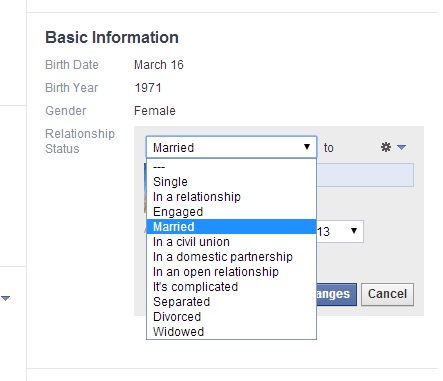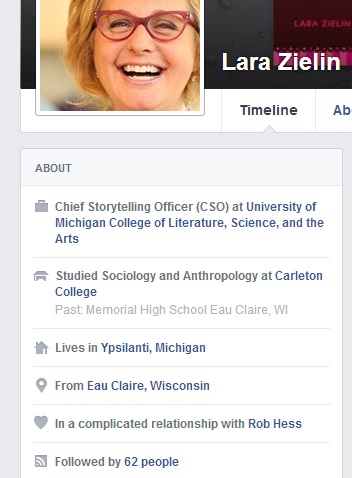They say no one knows what goes on behind closed doors.
But social media gives us more of a view of what’s happening in our friends’ lives, and sadly, I’ve gotten good at reading the signs of unraveling relationships.

Facebook gives users a wide range of relationship status choices, including “separated” and “divorced,” but I’ve never seen a friend be that direct in announcing the end. Instead, I’ve learned that subtle signs include:
- Change in pronouns — If a friend’s posts used to talk about what “we” did on vacation and “our” backyard, and now it’s all me and I, that shift in language might mean something.
- Invisible partner — If a friend’s mate is nowhere to be seen in photos, it could mean the partner is always the one taking pictures or is camera shy, but if he or she used to share photos of the two of them and now everything is solo, something’s probably changed.
- No more relationship status — Probably the most obvious red flag is disappearing Facebook’s relationship status, after previously saying “In a relationship with …” or “Married to …” Thankfully I haven’t been through a break up in the social media era, but I can imagine having that big fight where you think it’s over but either you just aren’t ready to say so or you’re holding out hope, so the logical choice is to retreat. Don’t actively declare it’s over, but don’t continue to announce you’re together.

Once I see these hints, I might investigate. After one friend hid his relationship status, I looked at his past few photos and quickly saw in one that he wasn’t wearing his wedding ring. Another friend was talking about looking for apartments, and again, it wasn’t “we.”
When I’m friends with both partners on Facebook, it’s sometimes more obvious because I see signs from both sides. I’ve watched a few splits play out like slow motion car crashes.
All of this begs the question, then what?
I try to imagine what I would do if I noticed these same changes some other way — if a coworker took her wedding picture off her desk, for example. A few years back a friend sent a Christmas card and signed it without her husband’s name. Are we close enough that I would acknowledge it and ask if everything’s OK?
If I can’t imagine this person wanting to talk to me about a philandering spouse or sleeping on the couch, I might just inform my own language with my suspicion. I don’t want to add to anyone’s pain or discomfort, so instead of asking “What did you two do this weekend?” I might say, “How was your weekend?” Or I might have a different reaction to moodiness or being late with no explanation or other off behavior.
But I also look for hints that the friend might want to talk. I’ve had friends open up to me in surprising ways when they needed an ear.
Of course, it’s more fun when the same signals go in the other direction. When you see “we” creeping into a friend’s posts, or the same person repeatedly commenting on a friend’s posts — or when a friend makes it official by declaring “In a relationship.”
I’m more comfortable speaking up to celebrate someone’s joy than to presume heartbreak.


3 Comments
Margaret Yang
This was spot-on. Although I think you are more perceptive than most. I know someone who was using “I” instead of “we” in her facebook posts for two years (Including “I’m moving,” and “I’m going on vacation.”) and some of her friends still thought she was married. Weird, huh?
Colleen Newvine Tebeau
I do think I have my antenna up more than some, but do you think other people missed those clues for two years because the friend seemed happy or content so they assumed all was well, or just because they were oblivious? There’s another whole post, if not more, on people hiding it well when they’re in pain.
H.T. Riekels
That’s why I’m up front about everything when it’s time. I don’t hint in a lead up. That way there is no room for speculation.
Leave a reply